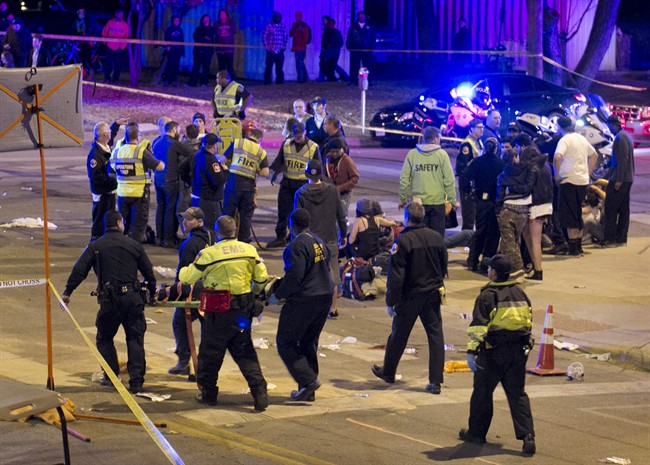A bill to expand workers compensation coverage for first responders in Ontario is once again stalled as the provincial legislature rises for the summer break.

The bill would force the Workplace Safety and Insurance Board (WSIB) to presume the job of the first responders caused their Post-Traumatic Stress Disorder (PTSD). Right now, police, firefighters, paramedics and other first responders have to prove it before receiving coverage.
But first responders in Alberta don’t – the workers’ compensation board presumes the job of a first responder, which brings them face to face with traumatic events almost daily, caused the diagnosis.
Manitoba legislators are debating Monday whether they should do the same thing.
NDP MPP Cheri DiNovo has introduced legislation – five times – to amend the WSIB act, allowing for presumptive care. The bill failed the first four times, but not for a lack of support — it has all-party support. Instead, it’s failed for procedural reasons like elections.
“I really don’t know what the holdup is, it’s strictly on the government side, for sure. Because we’ve been getting all the signals that it’s going to happen, it’s going to happen, and it hasn’t,” DiNovo said in an interview Monday.
READ MORE: First responders want PTSD recognized as a workplace hazard in B.C.
It’s back again, introduced almost as soon as the house sat following the June 2014 election and since then it’s been slowly making its way through the slow process.
But it’s stalled again as legislators take their summer break and won’t move at all until September when the house sits again.
“Everybody supports this, it’s baffling what the hold up (is) and it’s certainly baffling to those that are on the front line,” DiNovo said.
Craig MacBride, a spokesperson for Minister of Labour Kevin Flynn, said in a statement Monday that “Bill 2 has passed first reading, and the legislature will give the bill serious consideration, as it does all bills.”
He did not say, however, whether the bill will have the support of the Liberal party should it reach the floor of the legislature in the fall.
READ MORE: First responders with PTSD still facing barriers on the job
However, MacBride did say the government is studying similar legislation in Alberta and the party is “actively exploring a comprehensive package of next steps that we hope to bring forward soon.”
The Liberal party has been taking steps to address PTSD among first responders, however, and commissioned a report in 2012 to look into the issue. That report recommended a conference, which was held in May, brought together experts from policing, firefighting, emergency medical services, transit and other industries which face high rates of PTSD. It has also invested over $4 million to help the OPP create an Employee Wellness Section which dedicates resources to address mental health issues among its members.
READ MORE: Canadian first responders share their stories about dealing with PTSD
And WSIB does currently cover PTSD and other traumatic mental stress injuries.
DiNovo said the WSIB amendment is one of the “major demands” of the Ontario Police Association and is also supported by firefighters’ and paramedics’ associations.
The bill is also supported by the Tema Conter Memorial Trust which helps first responders battling PTSD. Vince Savoia, the executive director of the trust, suggested the Liberals could have easily brought forward their own legislation by now, if they were serious about addressing PTSD among first responders.
“I think this time around, the Liberals have a majority and they could have easily introduced their own legislation months ago and if this was really a priority for them, this bill could have been passed much sooner,” he said. “I get a sense that there’s a real reluctance to push this bill forward.”
The memorial trust also keeps track of how many first responders have killed themselves. To date, 22 Canadian first responders have killed themselves in 2015 – the bulk of which, Savoia said, were within Ontario. Twenty-seven killed themselves between April 29, 2014 and the New Year, according to the organization.
“Those rates of suicide are falling upon the deaf ears of government,” he said.
But the government does support the bill, to some extent. DiNovo’s private members bill did receive all-member support during its second reading but when DiNovo asked during Question Period in May whether or not the Liberal party would support the bill, she said she received “everything but yes.”
DiNovo: “Will the minister act today to have PTSD recognized in WSIB legislation for first responders?”
Flynn: “What the member is asking for is an improvement to that system. It’s one we take very, very seriously… We’ve taken a very good examination of how it’s done in the other provinces to see if that should apply to the province of Ontario. We’re very close, I think, to the end of that research, Speaker, where I will be able to bring some information back to my colleagues in the House.”
The Liberals have not said whether they will support the bill in the fall or introduce their own legislation.
Savoia describes the bill as a “good step” to recognizing the plight of first responders dealing with PTSD in the province but said it could go farther. 911 dispatchers and correctional officers (who suffer from higher rates of PTSD than first responders), aren’t included in the bill.
“They are the police officer, they are the firefighters, they are the paramedic until help arrives. And yet they’re forgotten”
- Tenants don’t have to foot unpaid tax bills for foreign landlords: minister
- Fort McMurray wildfire behaviour expected to be ‘subdued’ with cooler temperatures, rain
- Federal government rejects Toronto’s request for drug decriminalization
- Canadians should listen to CSIS head on TikTok warning, Trudeau says




Comments